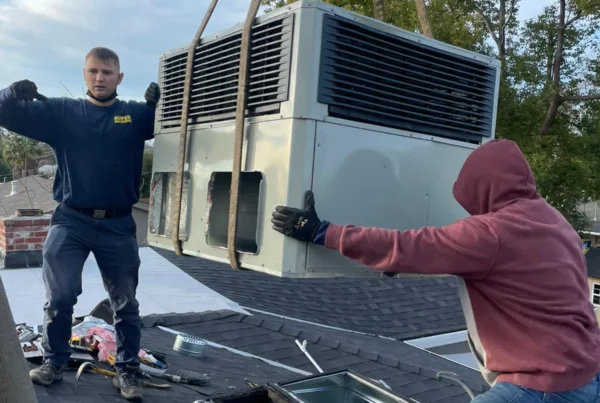Are you looking for a more energy-efficient way to heat water in your home? Traditional electric water heaters have been a household staple for years, but they come with a significant downside: high energy consumption and costs. With rising utility bills and growing environmental concerns, many homeowners are now turning to heat pump water heaters (HPWH). This innovative technology offers substantial savings and better efficiency compared to conventional electric resistance water heaters. In this article, we’ll explore the advantages, installation requirements, and why a heat pump water heater might be the perfect upgrade for your home.
What is a Heat Pump Water Heater?
A heat pump water heater works differently from traditional water heaters. Instead of generating heat directly using electrical resistance (as seen in stovetops or toasters), it transfers heat from the surrounding air to the water in the storage tank. It’s like a refrigerator working in reverse, using electricity to move heat rather than create it.
This unique functionality makes HPWHs up to 50% more energy-efficient than conventional electric water heaters. By reducing energy consumption, you not only save money on utility bills but also contribute to a more sustainable environment.
Benefits of Switching to a Heat Pump Water Heater
1. Significant Energy Savings
One of the main advantages of HPWHs is their energy efficiency. By moving heat instead of generating it, these systems use much less electricity. This can translate to lower monthly utility bills, which offsets the higher upfront cost of purchasing and installing the unit.
2. Environmental Benefits
Using less electricity reduces your home’s carbon footprint. For homeowners looking to live more sustainably, a heat pump water heater is an excellent choice.
3. Long-Term Cost Effectiveness
Although HPWHs have a higher initial cost, their operational savings make them more affordable in the long run. Over time, you’ll recoup your investment and continue to save on energy expenses.
4. Versatile Applications
Heat pump water heaters can be used for residential, commercial, and even industrial applications. They are ideal for homes looking to replace outdated electric water heaters and for properties aiming to reduce energy costs.
Considerations When Installing a Heat Pump Water Heater
Before you make the switch to a heat pump water heater, there are a few important factors to consider:
Location
HPWHs require sufficient airflow to operate efficiently, which means they need to be installed in well-ventilated areas with adequate space. Ideal locations include:
- Garages
- Basements
- Utility Rooms
Check the manufacturer’s recommendations to ensure proper placement for optimal performance.
Sizing
The size of your heat pump water heater is crucial to meet your household’s hot water needs. Look for a unit with the appropriate First-Hour Rating (FHR), which indicates how much hot water the system can deliver during peak usage periods. Proper sizing ensures you won’t run out of hot water during busy times.
Converting from Gas to Electric
If you currently use a gas water heater, converting to an electric heat pump system may require additional steps, including electrical work. Always consult local building codes and permits before starting the conversion process.
Rebates and Incentives for Heat Pump Water Heaters
Many utility companies and local governments offer rebates to homeowners who install energy-efficient appliances like HPWHs. These rebates can significantly offset the initial cost of the unit and installation.
Eligibility Criteria for Rebates:
- Energy Star Certification: Choose a model that meets ENERGY STAR® requirements.
- Energy Factor: The unit should have an energy factor (EF) of at least 2.0.
- Storage Capacity: A minimum of 50 gallons is usually required.
- Installation Standards: The system must be installed according to the manufacturer’s guidelines and local building codes.
To claim your rebate, you’ll typically need to:
- Download the Rebate Form: Available on utility company websites.
- Obtain a Building Permit: Ensure the installation complies with local regulations.
- Hire a Qualified Contractor: Professional installation is often a requirement for rebate eligibility.
- Submit the Application: File the rebate form within the specified timeframe (usually 60 days).
Heat Pump Water Heater vs. Traditional Electric Water Heater
If you’re still deciding whether to switch, here’s a quick comparison:
| Feature | Heat Pump Water Heater | Traditional Electric Water Heater |
| Energy Efficiency | 50% more efficient | Moderate efficiency |
| Operating Costs | Low | High |
| Initial Cost | Higher | Lower |
| Environmental Impact | Reduced carbon footprint | Higher emissions |
| Lifespan | 10–15 years | 8–12 years |
Steps to Install a Heat Pump Water Heater
1. Evaluate Your Needs
Determine your household’s hot water demand and the ideal location for the unit.
2. Choose the Right Model
Select a heat pump water heater that meets ENERGY STAR® standards and matches your household’s size and requirements.
3. Hire a Professional Installer
A qualified contractor will handle the installation, ensuring compliance with local codes and optimal performance.
4. Apply for Rebates
Submit your rebate application after installation to reduce the overall cost.
Why You Should Switch to a Heat Pump Water Heater
Switching to a heat pump water heater isn’t just about saving money—it’s an investment in your home’s energy efficiency and environmental sustainability. With rising energy costs and the push for greener solutions, upgrading your water heating system can make a big difference.
Whether you’re replacing an outdated electric water heater or looking for a smarter way to heat water, a heat pump water heater offers the perfect balance of efficiency, reliability, and cost savings.
Conclusion
Heat pump water heaters are the future of energy-efficient home appliances. By making the switch, you’ll not only reduce your utility bills but also contribute to a cleaner, more sustainable environment.
For professional installation and expert guidance, contact Super Brothers Plumbing Heating and Air. Our experienced team will help you choose the right system, handle the installation, and ensure your home enjoys the benefits of this innovative technology. Call us today to get started!



